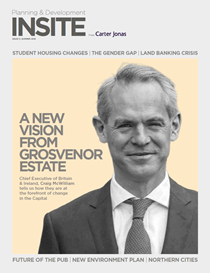We have lost 30,000 British pubs in the past 40 years. But is this a matter for concern? And more specifically, as many have claimed, is it a matter for which the development industry is responsible?
The prolific writer and historian Hilaire Belloc declared in 1912, “when you have lost your inns, drown your empty shelves, for you will have lost the last of England.”
With the exception of churches, British pubs are perhaps the oldest social institution in built form; on a par with the café culture of Paris or the souks of Marrakesh. Yet legislation such as the 2007 smoking ban, competition from the falling price of alcohol in supermarkets and shifts in consumer behaviour appear to have conspired against British pubs.
Despite all this, the most commonly held view is that too many British pubs are lost as a result of gentrification. The fact is that the value of a pub increases significantly with planning consent for residential use, and with large car parks, gardens and popular locations, pub sites are ideal for redevelopment or even conversion into apartments.
Planning policy has frequently intervened to protect pubs, though its success is not conclusive. Across the country, some local authorities have introduced Interim Planning Policy Guidance aimed at protecting pubs, together with measures such as providing viability and marketing assistance to British pub owners.
Colin Brown, partner at Carter Jonas, has substantial experience in development consultancy, including converting pubs, not only into residential schemes but also into more successful pubs often as part of a mixed-use scheme alongside new development. “We have seen a range of new entrants on the pub scene: small independent companies which have taken on failing pubs and have managed to introduce new audiences, new ranges of pub food and beverages, and completely turned them around. For example, City Pub Co. is a success across the South of England. They don’t just take on existing pubs, but also other quirky buildings such as shops and cinemas, even the ticket office of a railway station. “Pubs investing in the right market, and more importantly the right location, are bucking the trend – none more so than the City Pub Co’s Georgian Townhouse in Norwich which is a conversion of a house to a pub!”
As for pubs which are deemed to be assets of community value, the Localism Act legislated to protect them from extinction, albeit with varying levels of success. Colin says, “We currently have a situation whereby a client bought a struggling pub and wanted to demolish it and build two new houses in its place. The local community considered the pub an asset of community value and have had it designated as such. This effectively means that the site can’t be redeveloped or even sold for six months in order to allow for the local community to put in a bid. However, the legislation isn’t necessarily the solution that it was set out to be. After all, it’s rare that a local community possesses both the funds to purchase such businesses and the required experience to make them profitable. In addition, the owner of the site is not duty bound to sell to the community group, so it may be argued that the legislation buys time but does not always lead to the expected outcomes.”
The recently published draft NPPF contains a clause which states that, ‘Planning policies and decisions should enable the retention and development of accessible local services and community facilities, such as local shops, meeting places, sports venues, open space, cultural buildings, public houses and places of worship’, alongside the prerequisite of delivering more homes of course. Legislation exists to protect pubs, residential developments have been shown to come to the rescue of failing pubs, and ultimately those that have the potential to succeed, do succeed. Returning to Hilaire Belloc’s words, it would seem premature to ‘drown your empty selves’ over the demise of the British pub. Our pint glass is half full, rather than half empty, and raised in celebration of the fact that British pub culture, frequently in a new and improved form, is here to stay.
- Colin Brown, partner, is head of the Planning & Development Team in the eastern region. He has over 25 years’ of planning experience. Colin has been involved in all aspects of statutory planning from both a public and private sector perspective.
Read more articles like this by downloading our Summer 2018 Planning & Development Insite, or visit the Planning & Development pages of our website to find out more about our services.
In the fifth edition of our bi-annual property publication, Planning & Development Insite, we tackle some big issues including terrorism, the environment and the gender gap. We put influential people at the forefront, talking with Craig McWilliam of Grosvenor Estate about the changes they are making to the West End in light of Crossrail arriving and Jo Negrini of Croydon Council on what other British councils could learn from her success.
Latest news
- Carter Jonas announces strategic restructure of Planning and Development division with several senior promotions
- Do you have an interest in land within Mid Sussex District?
- Carter Jonas advises on sale of 45 residential units at Acton Gardens
- Carter Jonas Achieves Planning Consent for Harwell Science and Innovation Campus Limited Partnership
- Carter Jonas Confirms Sale of Land in Meir, Stoke-on-Trent to Potteries Heavy Haulage
- Carter Jonas Achieves Planning Consent for a Fusion Demonstration Plant at Culham Science Centre, Oxfordshire
- Carter Jonas Achieves Planning Consent for Endurance Estates Land Promotion Ltd in Longstanton, Cambridgeshire
- RTPI Young Planners’ Conference 2022
- Carter Jonas Partner Andrew Smith Elected SIOR European Region Chapter President






